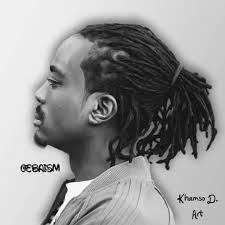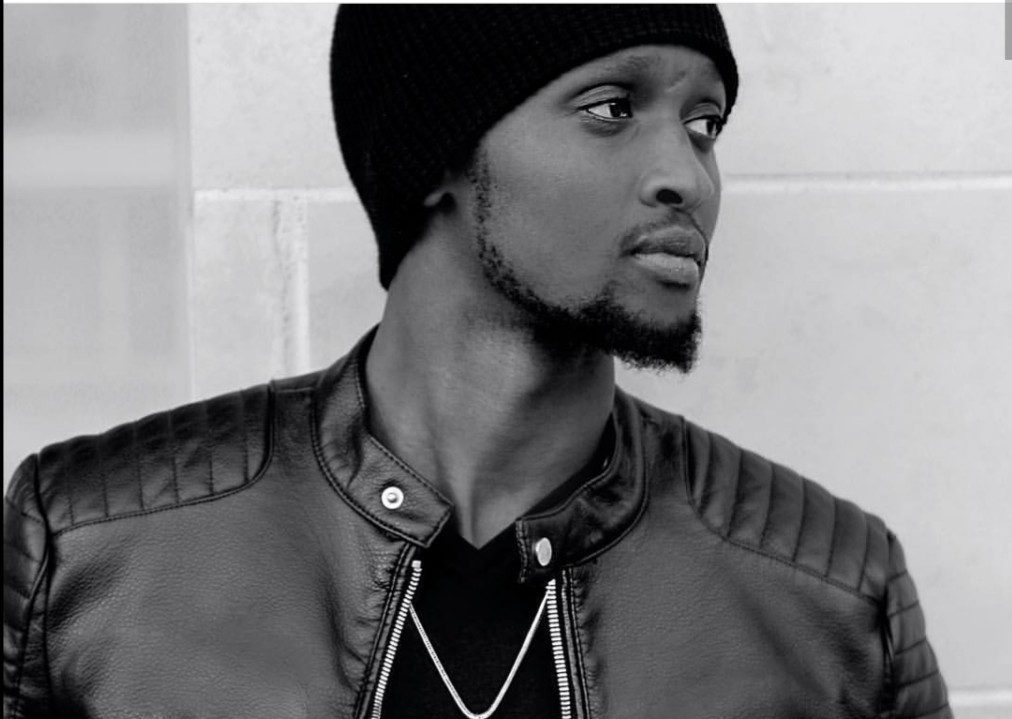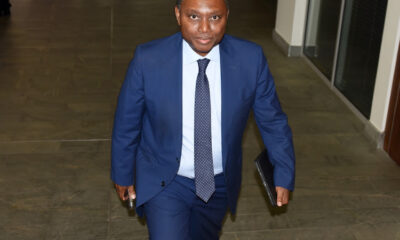

Celebrities & Sports
Willie Oeba:Is He the King of Urban Poetry in Kenya?
“ There’s so much to learn and harness as a creative by just being in that literature space. Be it actively or passively. With literature I have learnt oral, listening, writing and communication skills. I have learnt that what you write is as important as what you say, how you say it and when you say it. That’s what poetry is,”Willie Oeba
By Charles Wachira,
Wilson Oebah is rewriting the handbook of conscious rap in Kenya by brazenly calling out the duplicitous tendencies associated with the country’s political class including that of the general populace.
In his telling, the 27-year-old artist who has so far lived exclusively in Nakuru, a city located 165 Klm North of Nairobi, defines himself as an urban word poet.
“My goal is not to change the world but to inspire the mind that will change the world,” Willie Oeba as he is popularly referred to in the local artistic ecosystem says prophetically.
Beginning in 2019 when Willy dropped ISM as his first album, which was solely an in- my- hood inspired artistic work, the trajectory of his craftsmanship has grown organically to presently encompass a plucky national pedigree.
Examples abound.
Take for example the duo tracks of Dear Mr. President and Dear Mr. Deputy President, which are formatted as letters and addressed to the country’s two –top most politicians.
Here Willie calls them out ostensibly for double-dealing with particularly their political base and Kenyans in general.
Using the local creole language of sheng which is idolized by urban Kenyan youth, the two tracks arguably strike an immediacy chord with a potent demography that is expected to tilt national elections scheduled for 2022 in this East African state where 75 % of the population is under the age of 35.
The letters are verifiably contagious for their satirical candor including the baritone voice that Willy uses to deliver his essence.
Says he: Mr. Deputy President:
Wapi stadiums? (Where are the stadiums?) Ama umeamua kufanya kazi na hutaki mchezo? (Or you decided to work and you are not interested in sports)
The same students ulipromise (you promised) paid internships 2017, the same graduates unaoffer (you are now offering) wheelbarrow empowerment 2020. Zima hiyo kitu (Do away with this shamming)
Dear Mr. Deputy President, get this clear ma (the) youth hawataki (do not want) handouts, wanataka (they want) wages.
It turns out the country’s then Deputy President had publicly announced intentions of running for the presidency in 2022 and had earnestly engaged the hustings with critics saying his campaign was tinged with populism.
In 2022 the then-president was not expected to defend his seat having served the maximum two-five-year terms allowed by the constitution.
Also, Willie’s art reflects on generic themes that affect the youth including what it takes to be a patriot and what traits a grounded woman should aspire for in the track These Girls. Indeed just listening to his vibes is akin to taking a journey in the existential lives of generally Kenyans but with singular emphasis to the youth.
For his poetic lyrics strike a chord with this demography, which faces homogeneous crises key being unemployment, political exclusion and moral decadence.
And if you thought Willie is a wannabe when he aptly refers to himself as the local King of poetry you will be disappointed.
In 2017 he was recognized as East Africa Spoken Word Battle King and Blaze Safaricom Music Champion in a contest that attracted more than 1000 contestants.
In a country where authorities routinely take a hardline stance on artists who dare critique the social, political and economic malaise wrought on the Kenyan populace by arguably a corrupt, crooked and cheesy leadership Willie stands out as an outlier.
It turns out his alter ego and mentor Kenyan rapper Kennedy Ombima popularly known by his stage name, King Kaka has faced real threats to his life for releasing songs with heavy political undertones.
Presently Willie, an alumnus of the local Moi University where he studied Media Science, taking literature as a unit, believes the subject had a seminal effect on what he’s currently doing.
Hear him: “ There’s so much to learn and harness as a creative by just being in that literature space. Be it actively or passively. With literature I have learnt oral, listening, writing and communication skills. I have learnt that what you write is as important as what you say, how you say it and when you say it. That’s what poetry is.”
Adding that literature enables him to classify himself “ as a niche Artist because, at the end of the day, you can’t appeal to everyone. You need a niche to tap into if at all you want to be effective.”
The strapping 31-year-old lost his father to cancer in 2013 and being the eldest child in a family of five he subtly took over the responsibilities of catering for his siblings and ailing mother.
“ Growing up we did not have everything we needed and that built the resolve in me to fight for what I believe in. I have been raised in a God-fearing family set up and this has influenced my art,” he says.
Soon after completing his secondary education, Willie did odd jobs that included selling tea at the bus terminus in Nakuru. He also worked at construction sites to raise his university tuition fee.
“ At the University I started actively doing art to get paid and the monies that I received sustained me at the university.This move paid of for it saw me being nominated while in my second year as the official university Mcee and I performed in all the graduation and orientation ceremonies thus sustaining myself at the Uasin Gishu County-based institution.”
Adding: “ I knew the moment I stepped out to go to the University, it was expected of me to give back to the family because at that time my Dad had succumbed to cancer and mum had been struck by a stroke.
“ So the idea for all the four years while at the university was to give back to society and stay away from trouble. In my 3rd year I won the Blaze Music Champion by Safaricom and in my fourth and last year I was the most influential student in Moi University.”
Keywords: Willie Oeba: Conscious rap Kenya: Urban word poet: ISM album: Dear Mr. President
Celebrities & Sports
Rwandan Gospel Star Israel Mbonyi : A Journey of Hope
Beyond his musical talent, Israel Mbonyi is committed to philanthropy and social causes. In 2020, he launched the Israel Mbonyi Foundation to support vulnerable communities, focusing on orphaned children and educational opportunities. “I believe music can be a tool for change, and I want to be a part of that change,” he has stated in interviews.

Israel Mbonyicyambu is a celebrated Rwandan gospel singer and songwriter. Learn about his powerful music, impactful philanthropy, and inspiring journey to fame.
Israel Mbonyichambu, popularly known as Israel Mbonyi, has become a leading figure in the Rwandan gospel music scene. With a unique blend of heartfelt lyrics, soulful melodies, and vibrant performances, he has captured the hearts of many in Rwanda and beyond.
His journey from humble beginnings to stardom is not just a testament to his musical talent, but also to his unwavering faith and commitment to spreading a message of hope through his art.
Early Life and Musical Beginnings
Born in 1990 in Rwanda’s Eastern Province, Israel’s passion for music was evident from an early age.
He grew up in a family that deeply valued faith and spirituality, often attending church services where he was inspired by gospel music.
Israel recalls his early influences, stating, “I would listen to gospel songs and dream of one day being able to touch lives through music. It was my mother who encouraged me to sing in church, and that’s where it all began.”
In 2015, he took a significant step in his career by releasing his debut album, “Ibihe Bihinduka,” which translates to “Times Change.”
The album featured hits that resonated with audiences, showcasing his ability to blend contemporary sounds with traditional Rwandan music. This release marked the beginning of a remarkable journey in the gospel music industry.
Breakthrough and Recognition
Israel Mbonyi’s rise to fame was marked by his powerful vocal performances and poignant lyrics. In 2018, he released the album “Nzakubohora,” which solidified his status as a household name in Rwandan gospel music.
The title track became an anthem of hope, and the album garnered critical acclaim, earning him several awards at the Rwanda Gospel Music Awards.
His dedication to his craft was further recognized when he received the Best Gospel Artist Award in 2019. During his acceptance speech, he expressed gratitude, saying, “I want to thank God for this moment and everyone who has supported my journey. Music is a gift, and I aim to use it to glorify God and uplift people.” His words reflect not only his humility but also his commitment to using his platform for positive change.
A Voice for the Voiceless
Beyond his musical talent, Israel Mbonyi is known for his philanthropic efforts and dedication to social causes.
He has been involved in various initiatives aimed at helping vulnerable communities in Rwanda. In 2020, he launched the “Israel Mbonyi Foundation,” focusing on supporting orphaned children and providing educational opportunities. “I believe music can be a tool for change, and I want to be a part of that change,” he has stated in various interviews.
His song “Ni Njyewe” (It’s Me), released in 2021, embodies his mission to inspire individuals to embrace their true selves and overcome life’s challenges.
The uplifting lyrics encourage listeners to have faith and confidence, resonating deeply with many who have faced hardships.
Impact on Rwandan Culture
Israel Mbonyi’s impact extends beyond music; he has become a cultural icon in Rwanda. His performances often draw large crowds, and his concerts are known for their energetic and uplifting atmosphere.
In a 2022 interview, he reflected on his role as a performer, stating, “I see myself as a messenger. My goal is to spread hope and joy through my music. If I can bring a smile to someone’s face or inspire them to keep going, then I’ve done my job.”
As a prominent figure in the gospel music industry, Mbonyi also emphasizes the importance of collaboration among artists.
He believes that by working together, they can elevate the genre and reach a broader audience. In 2023, he collaborated with fellow Rwandan artist Meddy on the track “Ndi Uwo” (I Am Who I Am), which celebrated individuality and self-acceptance.
Conclusion
Israel Mbonyicyambu’s journey is one of resilience, passion, and purpose. From his humble beginnings to becoming a celebrated gospel artist, he continues to inspire many through his music and humanitarian efforts.
His ability to blend faith, culture, and community service serves as a powerful reminder of the transformative power of art. As he looks to the future, Israel Mbonyi remains committed to his mission: to spread love, hope, and the message of God’s grace through his music.
:Keywords:Israel Mbonyicyambu:Rwandan gospel music:gospel singer:inspirational journey:philanthropic efforts
Celebrities & Sports
Bruce Melodie: Rwanda’s Musical Sensation and Cultural Icon
Bruce Melodie’s passion for music ignited in school, inspired by legends like Koffi Olomide and Aaliyah, whose storytelling and emotive performances captivated him. His big break came in 2013 with “Abanyakigali,” a song that resonated with Rwandan youth, establishing him as a rising star. The infectious melody and relatable lyrics turned it into a local anthem, reflecting the aspirations of a generation.

Explore the remarkable journey of Bruce Melodie, a prominent Rwandan musician who blends Afrobeat and R&B with traditional sounds. From his early beginnings in Kigali to becoming a key player in East Africa’s music scene, Bruce’s resilience, creativity, and dedication to community empowerment shine through. Join us as we delve into his impactful story and musical evolution.
In the vibrant heart of Kigali, Rwanda, Bruce Melodie has emerged as a musical force, captivating audiences with his unique blend of Afrobeat, R&B, and traditional Rwandan sounds.
Born Bruce Itahiwacu on February 2, 1996, his journey began in a modest household where music was not just an art form but a way of life.
His parents, particularly his father, recognized his talent early on, encouraging him to explore the rich tapestry of Rwandan music.
Bruce’s passion for music ignited during his school years. Influenced by legends like Koffi Olomide and Aaliyah, he found inspiration in their storytelling and emotive performances.
His first big break came in 2013 when he released “Abanyakigali,” a song that resonated deeply with the youth and established him as a rising star.
The track’s infectious melody and relatable lyrics spoke to the aspirations and dreams of Rwandan youth, making it a local anthem.
In 2015, Bruce solidified his place in the music industry with the release of “Ikizere,” which became a national hit and showcased his ability to fuse modern sounds with traditional Rwandan themes.
His subsequent albums, including Mister 100 and Intashyo, further demonstrated his evolution as an artist, showcasing his versatility and artistic growth.
Songs like “Sina” and “Ntakibazo” have earned him accolades, including the prestigious Kigali Fashion Week Award for Best Musician and multiple nominations at the Salax Awards.
Beyond his musical prowess, Bruce Melodie is celebrated for his philanthropic efforts.
He actively engages in community initiatives, using his platform to advocate for youth empowerment and education.
His dedication to social causes is evident in his collaborations with various NGOs, focusing on issues like health and education, reflecting a commitment to giving back to the community that nurtured him.
However, Bruce’s journey hasn’t been without challenges.
The Rwandan music industry, while burgeoning, faces its hurdles, including competition and the need for broader international recognition.
Yet, Bruce’s resilience shines through as he navigates these challenges with determination and creativity.
He embraces the evolving digital landscape, leveraging social media to connect with fans across the globe, thus broadening his reach beyond Rwandan borders.
As Bruce Melodie continues to release new music, including his recent hits like “Ndi Uwo,” he remains dedicated to his craft and his roots.
His songs often reflect personal experiences and societal issues, resonating deeply with listeners. Bruce’s ability to blend genres and cultures positions him as a key player in Africa’s vibrant music scene, earning him a loyal following not only in Rwanda but throughout East Africa and beyond.
In the ever-evolving landscape of music, Bruce Melodie stands out as a symbol of hope and resilience.
His journey is a testament to the power of passion, hard work, and a commitment to one’s roots. As he continues to make waves in the industry, fans eagerly anticipate the next chapters of his musical journey, knowing that Bruce Melodie is just getting started.
Keywords: Bruce Melodie: Rwandan musician: East African music: Afrobeat and R&Bmusical journey
Celebrities & Sports
Meddy:The Rwandan Star Overcoming Controversy and Fame
Meddy adeptly navigates fame with steadfast dedication to his craft and fans. With new collaborations and a focus on heartfelt music, he is set to leave a lasting mark on the East African music scene. His journey reflects resilience in adversity, keeping fans eager for what’s next. Meddy’s story showcases both the challenges of a prominent artist and the rewards of hard work, solidifying his role as a key player in East Africa’s vibrant music landscape.

Discover Meddy’s rise in Rwandan music, hit songs, personal controversies, and resilience in overcoming challenges while captivating audiences across East Africa.
A Rise to Stardom
Rwandan musician Meddy, born Medard Ngabo, has become a prominent figure in the East African music scene with his smooth voice and captivating melodies.
Emerging from humble beginnings, Meddy has successfully blended Afrobeat, R&B, and pop to create a sound that resonates with fans across the region.
With chart-topping hits like Slowly and All Mine, he has carved out a niche as one of Rwanda’s most beloved artists, often celebrated for his romantic ballads and catchy hooks.
Musical Collaborations and International Appeal
As his popularity grew, Meddy began collaborating with various artists across East Africa, further expanding his reach.
Notably, his partnership with Ugandan star Fik Fameica on the track Sikeler showcased his versatility and ability to blend different musical styles. Meddy’s collaborations often highlight his adaptability, as he seamlessly incorporates diverse sounds while maintaining his unique flair.
His music has transcended borders, earning him fans not only in Rwanda but also in neighboring countries like Uganda, Kenya, and Tanzania.
Controversies and Personal Struggles
Despite his success, Meddy’s journey has not been without its controversies. In 2018, he faced backlash over accusations of being unfaithful to his longtime girlfriend and fellow artist, Sofia, which led to public scrutiny and discussions about celebrity relationships in Rwanda.
The scandal prompted Meddy to address the rumors directly, stating, “I am human, and I make mistakes. But I will always own up to my actions.” His candidness about the situation resonated with many fans, who appreciated his willingness to be vulnerable amidst the scrutiny of fame.
Facing Legal Issues
In addition to personal controversies, Meddy encountered legal challenges in 2021 when he was involved in a public dispute with his former record label.
He alleged mismanagement of funds and exploitation, leading to a heated exchange that garnered significant media attention. Meddy took to social media to express his frustration, stating, “I’ve worked hard for my career, and I won’t let anyone take advantage of my passion.”
The fallout from this dispute not only highlighted the struggles artists face in the industry but also emphasized Meddy’s determination to protect his brand and artistic integrity.
Resilience and Growth
Meddy’s resilience in the face of controversy has only served to strengthen his resolve as an artist. Following these challenges, he channeled his experiences into his music, releasing tracks that reflect his personal journey. His 2022 album, The New Beginning, showcased a more mature sound and featured themes of love, heartbreak, and redemption, allowing him to connect with fans on a deeper level. He remarked, “Every challenge I face becomes a part of my story. I want my music to inspire others who are going through tough times.”
A Bright Future Ahead
As Meddy continues to navigate the complexities of fame, he remains dedicated to his craft and his fans.
With plans for future collaborations and a commitment to producing music that speaks to the heart, he is set to leave an indelible mark on the East African music landscape. Meddy’s journey is a testament to the power of resilience and creativity in overcoming adversity, and his fans eagerly await what the next chapter holds for this talented artist.
Meddy’s story reflects not only the struggles of an artist in the spotlight but also the triumphs that come with hard work and dedication. As he continues to grow and evolve, there’s no doubt that Meddy will remain a key player in the ever-changing music scene of East Africa.
Keywords:Meddy:Rwandan musician:Afrobeat:controversies:East African music
-

 Business & Money8 months ago
Business & Money8 months agoEquity Group Announces Kshs 15.1 Billion Dividend Amid Strong Performance
-

 Politics2 months ago
Politics2 months agoFred Okengo Matiang’i vs. President William Ruto: A 2027 Election Showdown
-

 Politics2 months ago
Politics2 months agoIchung’wah Faces Mt. Kenya Backlash Over Gachagua Impeachment Support
-

 Politics4 months ago
Politics4 months agoPresident Ruto’s Bold Cabinet Dismissal Sparks Hope for Change
-

 Politics5 months ago
Politics5 months agoKenya Grapples with Investor Confidence Crisis Amid Tax Protest Fallout
-

 Politics5 months ago
Politics5 months agoPresident Ruto’s Lavish Spending Amid Kenya’s Economic Struggles Sparks Outrage
-

 Politics3 months ago
Politics3 months agoJohn Mbadi Takes Over Kenya’s Treasury: Challenges Ahead
-

 Business & Money1 week ago
Business & Money1 week agoMeet Kariuki Ngari: Standard Chartered Bank’s new CEO of Africa. What’s Next?














